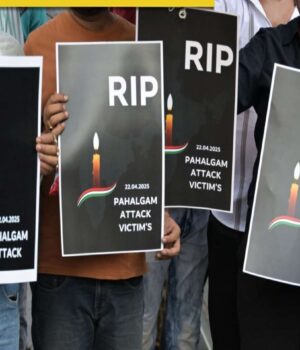Source : DNA INDIA NEWS
Protesting against the Pahalgam terrorist attack, in which 25 Hindu tourists and one local Muslim pony rider were killed, Kashmiris organised protests, candlelight vigils, and shutdowns to mourn victims and condemn the attack.
Protest Against Pahalgam Attack
For the first time in three decades, the Kashmiri masses have come out in the open condemning a terrorist attack. It shows a positive change and signals a paradigm shift in India’s struggle against secessionism and terrorism in Jammu and Kashmir. Protesting against the Pahalgam terrorist attack, in which 25 Hindu tourists and one local Muslim pony rider were killed, Kashmiris organised protests, candlelight vigils, and shutdowns to mourn victims and condemn the attack. Besides, women protested on the Jhelum River banks in Srinagar, and shikara operators on Dal Lake held demonstrations.
However, the moot question is, will this sympathy continue, or will it subside soon because of the short-sighted backlash against Kashmiris and the Muslims in particular?
Anti-Kashmiri backlash
Reports of Kashmiri students being “thrashed” in different parts of the country and calls for “Israel-like revenge” are pouring in. Social media sites are full of calls to “flatten Pahalgam” and “teach Kashmiris a lesson”. In numerous posts, people have attacked the concept of composite culture and targeted secular forces and liberals. The rhetoric against Kashmiris has been escalated to such a height that Jammu Kashmir Chief Minister Omar Abdullah has talked to some counterparts to ensure the safety and security of Kashmiris. The gravity of the situation can be gauged by the fact that some students have come out offering help to Kashmiri students out of the valley and declared helpline numbers.
Communal polarisation
The terrorists in Pahalgam asked some tourists to recite the “kalma” or the Islamic prayer, and shot them when they failed to do so. Reacting to this, RSS chief Mohan Bhagwat declared that “Hindus would never do such a thing.” This kind of statement could exacerbate communal narratives and alienate Muslims, particularly Kashmiris.
Heavy-handed approach of security agencies
Analysts also believe any heavy-handed approach of the security forces may alienate the people of Kashmir further. In the aftermath of earlier terrorist attacks, security forces have handled counterinsurgency operations in the most unacceptable ways. The cordon-and-search missions, combing operations, detentions, and blowing away of the houses of the suspected terrorists have angered the local population. Similarly, detentions under the Armed Forces Special Powers Act (AFSPA) have also alienated Kashmiris and fueled perceptions of collective punishment.
A similar approach post-Pahalgam, such as mass arrests or internet shutdowns, could erode goodwill. The people of the Kashmir Valley are yet to forget the 2019 crackdown post-Article 370, which included communication blackouts and arrests of leaders.
Economic problem
Though the people related to the tourism sector have come in large numbers to protest against the Pahalgam terrorist attack, it is less likely that the people from the rest of the country would go to visit the Kashmir Valley the way they used to before this attack. A prolonged tourism decline could bring economic hardship and joblessness to the people, who may develop resentment against the Indian state.
Though analysts believe India is unlikely to lose the sympathy of the Kashmiri people immediately after the Pahalgam attack, authorities, policymakers, and politicians must work cautiously. Kashmiris have rejected Pakistan-backed terrorism. Driven by economic reliance on tourism and frustration with external militancy, they have aligned themselves with India’s narrative. The ruling party BJP, the RSS and the Hindutva outfits affiliated with it must not exploit this opportunity to further their political end.
SOURCE : DNA NEW




